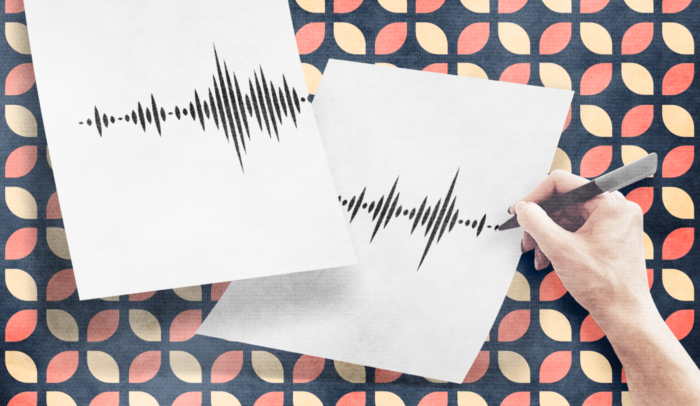When you talk to someone, do you have to “find your voice?”
Of course not. You just talk.
Your voice isn’t something you “find.” It’s not hiding between the couch cushions or under the bed. It’s already there, inside of you and a part of you.
So why do so many writers talk about “finding” their voice like it’s a complicated thing?
Because they’re trying to look fancy and sophisticated. The fact is, it isn’t complicated. Elitist writers just want you to think it is.
Every Author has a unique voice, and you don’t have to do anything special to find it.
In this post, I’ll provide a definition of voice and debunk the myth that “finding your voice” is hard. Most importantly, I’ll show you exactly how to do it.
What Is Voice in Writing?
In writing, “voice” is how you speak and think. It’s all about the words you use and the patterns in your writing.
Do you use a lot of rhetorical questions? Long or short sentences? Slang?
Those are all ways your voice might come through in your writing.
Let’s look at a few examples of voice.
Tiffany Haddish is a comedian who grew up in one of the poorest neighborhoods of South Central Los Angeles. She’s made a living off making people laugh, without pulling any punches.
Here’s the opening of her book, The Last Black Unicorn:
Hello, my name is Tiffany Haddish. I would like to invite you to read about a few of my experiences in life so far. I know that a lot of these stories will seem unbelievable. Shit, I look back over my life and I’m like, “For real, that happened?” Either you will cry or laugh, and I try my best to figure out how to do the second one. I know life is no laughing matter, but having experiences can be.
When you read this, you can practically hear Tiffany talking. It’s like having a conversation with her. Her voice comes through loud and clear.
She uses humor. She’s candid, and she doesn’t always stick to formal, proper grammar.
Here’s another, very different example.
This is the opening to Can’t Hurt Me by David Goggins, a U.S. Armed Forces icon:
Do you know who you really are and what you’re capable of? I’m sure you think so, but just because you believe something doesn’t make it true. Denial is the ultimate comfort zone. Don’t worry. You aren’t alone. In every town, in every country, all over the world, millions roam the streets, dead-eyed as zombies, addicted to comfort, embracing a victim’s mentality and unaware of their true potential.
David’s voice is totally different from Tiffany’s. But it still feels like you’re having a conversation with him. It feels authentic.
His tone is more serious, but it’s still friendly. His sentences are short and direct (except for that last sentence, where he uses repetition to make a point). David’s writing is emphatic, and it makes you want to keep reading.
That’s the power of an Author’s voice.
It’s completely and totally theirs.
It’s real.
It’s powerful.
To be clear, your “voice” is different from your writing style.
Your voice is about how you communicate. In any conversation, on any given day, you’re using your natural voice.
Style is about how you approach the reader. It’s either geared toward persuading the reader, explaining something to the reader, telling the reader a story, or describing something to the reader.
No matter what your style is, you’ll have a consistent voice that shines through.
How Do I Find My Writer’s Voice?
You don’t.
People with literature degrees want you to believe that your writer’s voice is something you have to work really hard on. They’ll tell you it’s something you have to develop over time as part of your craft.
That’s not true. Your voice is already part of who you are.
So, if it’s already part of you, why is it hard to find?
It’s not.
Believe it or not, you don’t have to find your Author’s voice. It’s your own voice.
You already have a unique way of speaking/thinking/talking. That’s your writer’s voice. It’s the same thing.

You’re probably just getting in your own way because you’re not used to writing—and because you’ve bought into the belief that writing is “high art.”
It isn’t. Or at least it shouldn’t be.
Writing is about communicating ideas, not showing off.
You communicate every day. Trust yourself, and get out of your own way.
How to Develop Your Writer’s Voice
Your voice is already part of you, but if you’re like most people, you’re probably more comfortable speaking in your voice than writing in it.
If you find yourself in this camp, there are 6 things you can do to get yourself back on track.
To be clear, these aren’t tips for “finding your voice.” They’re tips for remembering you already have one.
1. Stop Trying to Sound Like Someone Else
One of the biggest writing mistakes is when people try to emulate someone else’s writing.
Don’t do this.
I don’t care how great a writer they are or how much you like their book. You’re not them. You’re you.
You have to be yourself because that’s who readers want to engage with. They picked up your book because they thought you could help them solve their problems. If they thought someone else could do it better, they would have bought their book instead.
Give readers what they want: your knowledge, in your words. If you speak to them clearly, honestly, and authentically, you’ll have a strong voice.
Chances are, you like the Authors you like because they stayed true to themselves. They stand out because they’ve let their authentic voice come through in their writing.
There’s nothing authentic about a copycat. And it only takes readers a minute to catch on when someone isn’t being real with them.
If you want to publish a good book, stop trying to live up to other good books. Instead, live up to yourself.
Let your unique point of view come through.
2. Stop Trying to Sound Smart
This is a subset of the first problem, but I’m highlighting it here because it’s something I see all the time.
Authors often try to use fancy words or complicated sentence structure because they think that’s how writing is “supposed” to sound.
Or, they think they have to “sound smart” for readers to perceive them as smart.
Wrong.
I don’t care how smart you are. No one wants to read complicated, dense writing. It doesn’t make you sound smart. It makes you sound unrelatable.
I blame English professors—and textbooks, most of which are horrible.They make people think they have to have some fancy literary voice if they want to be taken seriously.
But be honest. When’s the last time you’ve picked up a book in your spare time and said, “I really want something I have to slog through?”
Never.
So don’t make readers slog through your book. They won’t do it.
Complicated words won’t make you sound more authoritative.
Know what will? Good information, delivered clearly and plainly.
Keep your word choice simple and skip the “authorial voice” you think you “should” have.
People appreciate straight shooters more than they appreciate faux-intellectualism or headaches.
3. Stop Worrying About Grammar
The best way to write is the way you talk. And the way you talk won’t always be grammatically correct.
That’s fine.
Stop worrying about grammar, especially when you’re writing your first draft. In reality, grammar rules aren’t rules. They’re suggestions.
Grammar rules are arbitrary conventions that people agree on. Except there is no set of people who are in charge and no formal agreements. That’s why there are so many different grammar books out there.
There are only 2 reasons that grammar even matters in writing:
- It makes communication easier
- People expect good grammar (which is why it makes communication easier)
You want your book to look professional, but more importantly, you want your book to connect with readers.
People respond to people—not rules, and not grammar.
When you write the way you speak, people will connect with it.
Maybe that means using sentence fragments. Like this. Or maybe it means starting a sentence with a conjunction.
Maybe it means being colloquial. Did you notice that Tiffany Haddish said, “I look back over my life and I’m like, ‘For real, that happened?'”
Most grammar books would never encourage you to use “I’m like” as a stand-in for “I said.” But it sounds like Tiffany, and it makes her far more relatable.
Everyone has their own unique way of speaking. You should also embrace your own unique way of writing. It’s okay to break the rules.
Of course, you want your book to look professional, but you can always fix spelling and punctuation mistakes down the line.
Once you’re done writing, hand the manuscript over to a good editor, copyeditor, and/or proofreader. But even then, take their suggestions with a grain of salt.
The most important thing is to preserve your narrative voice and make a connection with the reader.
4. Stop Editing Yourself
I’ll take my earlier advice one step further: don’t just stop worrying about grammar. Stop worrying about how you sound at all.
Just get your ideas down on paper. Your first draft doesn’t have to be perfect. In fact, it won’t be.
Give yourself permission to write a mediocre first draft. Hell, give yourself permission to write a terrible first draft.
I always advise Authors to write what we call a “vomit draft.” Spew your thoughts onto paper and stop worrying about whether they sound good.
Just get it all out. Get every thought that’s in your head onto the paper.
Like vomiting, it’s not going to be pretty. But it will be real. It will encapsulate your writing voice.
The more you agonize over putting your thoughts on paper, the less natural they’re going to sound. You’ll question your natural flow of thoughts, and you’ll probably edit out all the tics that make your voice sound like you.
Plus, it’s a lot easier to fix a second draft than it is to write a “perfect” first one.
Think of your vomit draft as a starting place that helps you drill down to the essence of your voice.
Here are 2 frames that might help you channel your own voice in the vomit draft:
- Imagine that you’re having a conversation with a friend. It takes the pressure off, guarantees that you’ll be more natural, and ensures that you’re thinking about what the other person is learning and taking in.
- Imagine you’re helping a stranger heal the same pain you had. This helps you focus on actionable advice and helps you stay focused on your reader.
Want to really ace this “writing voice” thing?
Do both.
Envision yourself helping a friend through something difficult you’ve already figured out.
Why does this work? Because your mind won’t be on your voice at all. It will be focused on helping someone you care about.
Your voice will emerge organically.
5. Write Like You’re Not Finished
I just said that your vomit draft will probably be terrible. But in another sense, your vomit draft will be great.
That’s because it’s exactly what it needs to be: a draft.
Many successful people are perfectionists. They desperately want things to be “right,” and they have high expectations for themselves. When they write, they want every word to be spot-on.
Now, imagine if you put that much pressure on yourself every time you opened your mouth.
What would happen if every word you spoke had to be perfect?
You’d never say anything.

You can’t have a natural voice—or a voice at all—if you’re hung up on perfectionism.
Every great book starts out as a bad book, or at least a mediocre book. I promise. That’s because writing a book is a long process. You can’t treat it like a one-and-done thing.
A book starts with a rough draft—emphasis on “rough.” Then, over time, it gets better. And better. And better.
I can’t tell you how many Authors I’ve seen who get discouraged at the beginning of the writing process. They let their fear get in the way, and they get stuck. They worry that their books won’t be “good enough” or that people won’t care.
Many of them give up.
It’s important to keep perspective. This is a process. Your voice will develop over successive drafts. It doesn’t have to be perfect right out of the gate.
Ernest Hemingway had one of the most distinctive voices in literature, and he was an obsessive editor. He was never content with his early drafts.
Stop trying to write like you’re writing a finished book. You’re not. You’re writing a draft. When you embrace that and loosen up, your writing voice will sound much more natural.
6. Talk It Out Instead of Writing It Down
An Author’s voice is called a “voice” for a reason. It’s directly related to how a person speaks and communicates.
One thing that makes tapping into your own voice so hard is that it’s hard to type as fast as you speak.
When you’re sitting at a keyboard, your ideas often outpace your ability to get them down. That interrupts your flow and makes the entire writing process feel stilted and awkward.
If you’re having trouble keeping up, stop trying to write. Talk it out instead.
After all, who said you had to write your book? You can speak it just as easily.
I recommend dictating your book and sending the recording to a transcription service.
With roughly 10 hours of talking and a few minutes of file conversion time, you’ll have a workable vomit draft.
Better yet, you’ll have a workable vomit draft in your own voice. Literally.
If you struggle with the idea of dictating that much content, go back to the 2 frames I suggested above. Instead of imagining talking to a friend, actually do it.
Have a conversation with someone else about your book’s subject, and use that conversation as your guide for your rough draft.
We’ve all heard of writer’s block, but there’s no such thing as speaker’s block. There’s a good reason for that.
It’s easy to talk to a friend. You don’t worry about sounding smart or needing to find your voice. You just speak, and your voice emerges naturally.
Don’t make writing a book more complicated than it has to be. When in doubt, let your actual voice do the “writing” for you.


